Today we are chatting with Desert Dwellers! Desert Dwellers is the convergence of music producers Amani Friend and Treavor Moontribe, who honed their individual crafts in the mystical deserts of California and New Mexico, long before electronic music reached mainstream. Amani and Treavor combine the raw sounds of the natural world, wrapped in dance-floor and chill-out productions; blending deep bass, earthy percussion, etheric voices, and cross-cultural instrumentation into the sonic incense for the mind and body. Desert Dwellers’ unique global sounds are a bridge between worlds, and their label Desert Trax has become a platform to spotlight similar alchemical artists.
Brought together in the late ‘90s through the legendary Moontribe gatherings, in 2019 the duo celebrated their 20th anniversary of making music together, adding depth to their reputation as a pioneering and prolific downtempo, psybass, and tribal house act from the United States. The culmination of two decades of partnership has forged their Beatport #1 selling electronica album BREATH, out on Black Swan Sounds, which features more than 20 musicians and vocalists over a 10-track journey.
Interview made by Melissa Lara Clissold and Iurii GAGARIN PROJECT on 25/10/2019
Hello Desert Dwellers!
As someone who has listened to your music for a long time, it’s great to be able to interview you. So, you have released your new album ‘Breath’ on the 26th April 2019, can you please tell us a little about the feel of this album and what it means to you? Also, why did you decide to call it ‘Breath?’
There was definitely a clear vision early on for Breath, which was to complete the fourth offering in our series of Elemental releases (Waves, Flames, and Roots being the first three). We wanted to focus on the voice, and started to record folk songs from antiquity in as many different languages as we could with our main singer Meagan Chandler and some others. From there we flushed out the studio sessions based around these initial songs, often recording wind instruments to accompany the vocals. Early on in the vision of the album we were thinking about making a pure ambient album, but that shifted a couple songs in as we really wanted to explore the emerging downtempo-house genre. we still have two pure ambient songs as bookends to the album. We also wanted the album to have as much of an organic and studio session feel as possible and we ended up recording 20 different musicians on it!
I always also like to ask in interviews, why the name ‘Desert Dwellers?’
We both grew up in desert bio regions, organizing electronic music gatherings deep in the desert landscapes, under the full moon and the stars. The name Desert Dwellers comes from our initial nomadic wanderings through the deserts of California, New Mexico, and Nevada for these events.
As someone from Turkey, I notice you always use a lot of different instruments and ethnic melodies. How has this evolved over these years?
For Amani, growing up in New Mexico offered him the opportunity to learn and surround himself in many diverse cultural music heritages from Africa, to the Middle East, to East India, to Australia, to Japan, and Indigenous Native Americans. This passion of music from around the world has always been an integral part of his creative expression.
For Treavor it was simply about enjoying the sounds of the instruments and vocals. Before he even know what instruments he was hearing or where the vocals originated he just loved the way they sounded especially in electronic music.
How do you decide upon the names of the tracks?
Often the naming of tracks come at the very end, once the vibe and feel of the track has really presented itself in all it’s form. Then the name just comes to one of us and we know it when we hear it.
Where did you record the album? How long did it take?
We recorded it all in Santa Fe, Los Angeles, Boulder, and many various stops along the way on our Tour like Australia. It took 3 years to complete Breath.
I absolutely love the atmospheric beginning of ‘Longing for Home’. The beat and then the bass that follows. For a song such as this, where do you usually start? Is it the bass line that shapes the composition?
For all the tracks on this album we started with the vocal and built the song up around those traditional songs … yes usually adding the beat, percussion and bass first around the vocals and then expanding from there.
Another one of my favourites is ‘Breathing the Mysteries.’ Other than the individual songs, there is indeed a story throughout the album and it culminates in this somewhat shamanic / spiritual song. Do you think that the world is indeed heading towards a somewhat ‘spiritual revolution’ of raised awareness? What do you think music’s role is for this awakening?
We sincerely hope people are becoming more aware of how to better take care of themselves, how to help better steward the planet, and to better accept and love one another. We hope this music offers a lense for people to see the bigger picture and how we are all connected in this reality. Humanity definitely needs a wake up call to action if we are to make it through these next few decades and sustain a planet worth leaving to future generations.
You’ve probably received this question a lot of times…but who are your most recent influences? And also influences that have been with you from the beginning of your musical career.
In music everyone from Bob Marley to John McLaughlin to Pink Floyd to Shpongle to Eat Static to Dub and Metal and Hip Hop and everything else!
Would be great to get a bit technical, Who did the mixing and mastering of the songs?
For this album we had it mixed professionally on an SSL board and each individual sound was processed through analog gear. That process was engineered by Justin Gariano (TreeHaus Recording) in LA. It was mastered by our usual Mastering guru Gregor Zemlijic at GZ Mastering.
Did you use hardware synths or other hardware in this album?
In the mixing phase we did have a lot of analog hardware … but this wasn’t a very synth heavy album in general. But we do have some sweet synths in both our studios now, like the Moog Sub37, Arturia Matrix Brute, Roland TB03 and many others.
What software do you use these days?
Logic Audio for many years now.
Do you use sample libraries or Native Instruments Kontakt?
On Breath, we tended to record a lot of our own sounds as much as possible. We also have loads and loads of Kontakt Libraries we can utilize.
What are your favorite software synths and audio plugins these days?
For software synths we gravitate towards Serum, Omnisphere, Diva, Dune, Arturia synth suite, Hexeract, Hive, the U-HE Instruments, and the Native Instruments Suite.
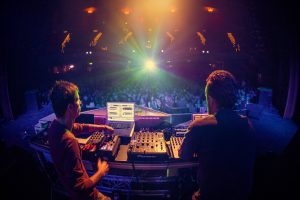
Do you have a classical music training or maybe you have gone through music production school circuit? Can you tell about the importance of this experience to your actual skill?
For Amani, he started formal music lessons at age 5 on the piano, continued music school in his early teens and then went on to graduate with a BFA in Music Technology from the college of Santa Fe in 1998. of course, yes this was all crucial to developing skills, but it’s honestly not as necessary anymore especially in this day and age with YouTube University and other online courses and programs, but always good to learn an instrument and learn how to play with others.
For Treavor he sang in choir at a young age before discovering the guitar around age 12. In High School he was in a metal band while also discovering classic Psychedelic music. He never attended school for music and taught himself how to use synths and computers in his later high school years once he discovered raves in Los Angeles.
It might be a bit early to ask, but …. What can we expect from you in the future, do you already have an idea for next album ?
Right now we are working on getting 3 distinct remix albums of Breath out to the world. The first volume will come out in Early February and is focused on the Bass/Glitch genre with remixes from Bluetech, Pitch Black, Nanosphere, Somatoast, Globular, Halfred, Drrtywulvz, Tribone, Mindex, Mumukshu, GUMI, Erothyme, Dissolv, and MantisMash. After that release we are planning on two more volumes of remixes, one in the slow house/electronica genre and the other in the uptempo 4/4 realms. In addition to that we both are working on several exciting productions for our solo projects, Liquid Bloom, PheuZen, Forever & Ever, and Variant Field. For new Desert Dwellers music, we have a few tracks started in the 115 bpm range that we are excited about as well as a collaboration with world renowned artist Burn In Noise and exciting DD remixes for artists like Vini Vici and others!
And now a bit about festival life, you are spending so much time on the road and in place. What secrets do you use to be healthy and full of energy to give? Some daily practices? Some special medicine or herbs?
Both of us have never been into drinking alcohol which is a huge help for us staying healthy right there. We also try to eat good quality food and organic ingredients on the road, drink plenty of spring water and maintain our sleep as much as possible!
For Amani, he also has a daily meditation practice that keeps his mind at ease on the road.
What was the most magical festival for you in recent years (2017-2019)?
Oregon Eclipse 2017
Anything else you would like to add?
The album Breath is the final installment of the Downtemple Dub series even though we left that out of the title itself. We really wanted to do something totally different than our last album We love that “bass music”, but we grew tired of that sound lately and in a way this album is a return to our roots in the Tribal House genre. Many people don’t know that when we started making music together we were making faster, uptempo house and techno styles. The obvious difference here is that we’ve slowed that style way down to make it sort of Downtempo House if you will.
Thank you for your time ….. if you wish to transmit a message to our readers please do it
Please support your favorite artists and buy their music from their bandcamp pages even if you only stream it on spotify! It‘s rough out there for musicians these days, so buy their VInyl, sign up on their Patreon pages, tell your friends and spread the word! Thank you all for your support over the years, we are eternally grateful to be able to do what we do and we owe it all to you, the listeners.
Links:
desertdwellersmusic.bandcamp.com
instagram.com/desert_dwellers_music
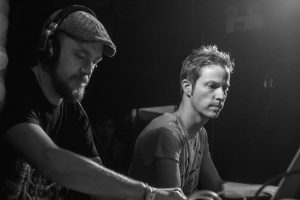

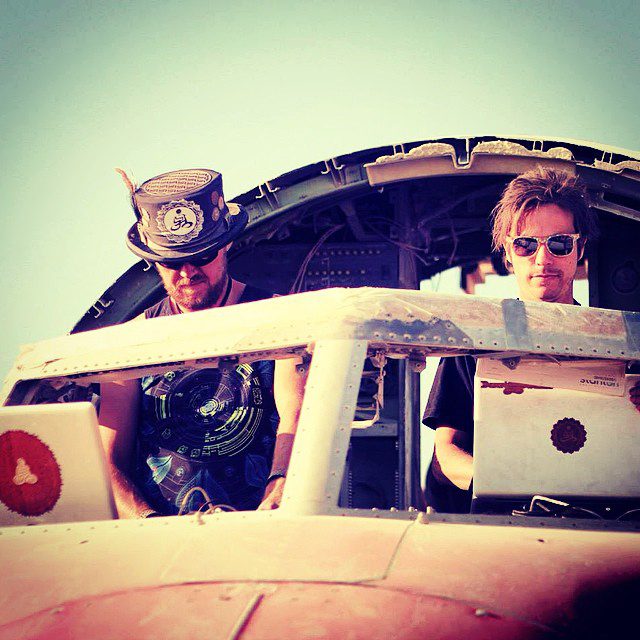
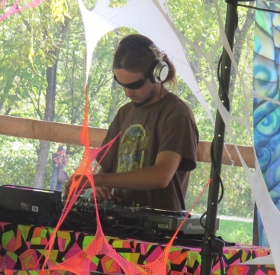
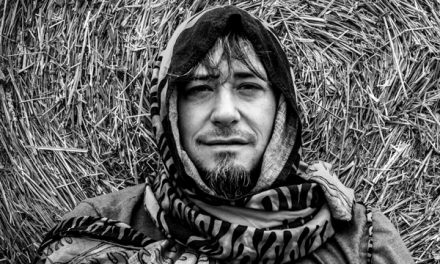
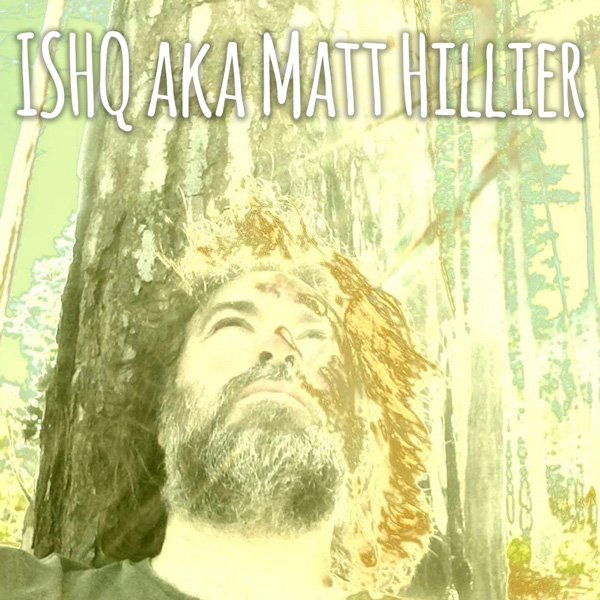
![[interview] 5 questions with Johnny Blue](https://www.psybient.org/love/wp-content/uploads/johnny-blue.jpg)
